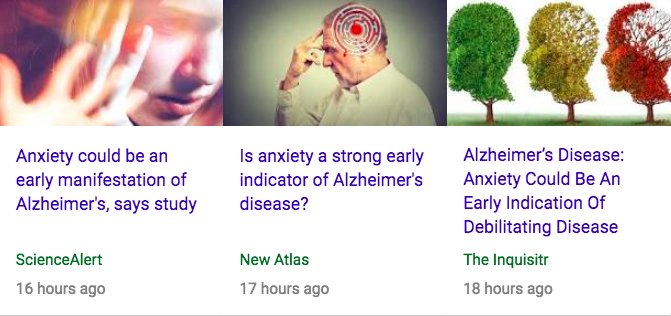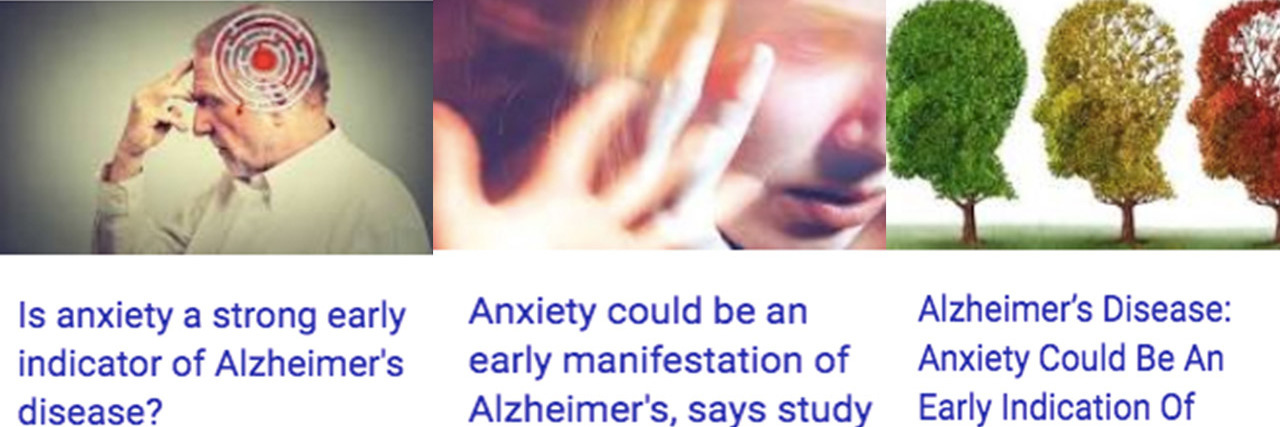What are you supposed to do when, as a person struggling with health anxiety, you come across an article linking anxiety to a disease you’re already terrified of?
This is exactly what happened to me, scrolling through the news on my morning break. Suddenly, there it was, as if the words had been highlighted and circled in red ink: “Anxiety Could Be an Early Manifestation of Alzheimer’s, Says Study.”
I’m already terrified of losing my memory and my identity. As a person living with health anxiety, this is second only to my fear of dying young. I don’t have a great memory at the best of times; I forget entire conversations, celebrity names, birthdays, important tasks… I worry about my own mother’s memory, and how she could very well have the warning signs of Alzheimer’s disease. So, when the aforementioned ScienceAlert headline grabbed my attention, I bit.
Did this apply to me? Did all my recent memory lapses point toward an undiagnosed disease, waiting for me in the not-so-distant future? My anxiety has been increasing lately with no obvious cause; is this a sign that my time is running out? Am I going to forget my loved ones? Am I going to forget myself?

I’m never going to refute the importance of articles such as this one, or associated reporting by sites such as PsychCentral or New Atlas. The significance of this study, published in The American Journal of Psychiatry, cannot be understated. Since substantial neurological damage is typically already done by the time clinical symptoms of Alzheimer’s are clear enough to diagnose, early indicators are of vital importance to successful treatment of the disease — especially since “anxiety symptoms could be a manifestation of Alzheimer’s disease prior to the onset of cognitive impairment,” as stated by first author Nancy Donovan, M.D., a geriatric psychiatrist at Brigham and Women’s Hospital. This could, therefore, be one of our earliest indicators.
But what about people whose anxiety may be worsening on its own, and who may be triggered by health articles such as this? All reporting I’ve found on the study makes it clear that anxiety could be an early manifestation in older adults; participants in the study included 270 “cognitively normal” men and women between 62 and 90 years old. As a 30-year-old man, I’d say I fall significantly outside of that danger zone.
And yet, while rare, early-onset Alzheimer’s disease can occur in people as young as 30.
So while these outlets are not to blame for their reporting, per say, greater care should perhaps be taken in the manner in which such articles are presented. Responsible initial reporting is of vital importance, and unfortunately, the opposite has been displayed here. These attention-wrestling, click-baiting headlines (like “Is Anxiety a Strong Indicator of Alzheimer’s Disease) failed to mention the significant age range the study covered; simply the inclusion of “older adults” may have saved me and others an onset of health anxiety. ScienceAlert’s stock photo — my initial encounter with this study — showed a young woman clutching her temples in anxious fear, not an older person.
It seems, in today’s fast-paced world of quickly consumed media, some outlets will do anything for a click.
Call me jaded, but I’m not expecting anything here to change. I’m not expecting media outlets to come across this article and weep for absolution. It should, therefore, be partly upon ourselves, as people living with the demon of health anxiety, to practice safer web browsing. It’s partly upon us to learn how to wrestle our demons and call out misleading information. Fear-mongering may not be the way to responsibly report on mental and physical health, but neither is the fear-mongering employed by our anxiety disorders.
I spoke with Dr. Debra Kissen, Ph.D., M.H.S.A., clinical director at Chicago’s Light on Anxiety CBT Treatment Center and a member of the Anxiety and Depression Association of America (ADAA), about her thoughts on the matter.
“One of my first homework assignments for clients I am seeing for health anxiety, panic and other anxiety disorders is to restrain from reading any health information online,” she told me. “If they have a legitimate medical question they should go to their provider to obtain information. Many individuals struggling with anxiety have a difficult time tolerating uncertainty and they, therefore, consult Dr. Google on a frequent basis to obtain confirmation that they are OK. Of course, once going down the rabbit hole, they quickly feel less and less OK as they recognize themselves in a broad array of health conditions.”
We’re all guilty of this, I think, to some degree. For those of us with health anxiety, however, it can be a bottomless pit. I’ve convinced myself I have cancer based on what I now know to be a harmless lipoma. I hid that one for years. I’ve Googled for signs my memory problems could be Alzheimer’s, and also found articles proclaiming I could have a brain tumor.
So, what can we do about headlines such as the above? For one, Dr. Kissen agrees it’s important to know headlines about health can be intentionally misleading.
“Health articles targeting consumers are written to be attention-grabbing. A headline about how unlikely it is for a headache to actually be a brain tumor would not get as many clicks as an article about one of the key symptoms of a brain tumor being a headache. Both of these facts may be true, but the first will be associated with less ad revenue than the second.”
As far as what to do when you get triggered by an article, Kissen offered a few suggestions:
1. Work on your “tolerating uncertainty muscle.” Don’t give in to the compulsion to seek out health information when feeling anxious about a new sensation in your body.
2. If you avoid triggering words (like “cancer,” “death” or “stroke“), you should instead expose yourself to these terms. The more you try to avoid them, the more anxiety you will feel when exposed to them.
I’m sure I’m as guilty of avoiding anything related to Alzheimer’s disease or cancer as the next person until it suits my anxiety to Google said conditions in an anxious flurry. So, we should learn to expose ourselves; we should read more of these articles, responsibly and within the confines of our therapist’s care plan, to gradually loosen anxiety’s stranglehold on us. Of course, if you’re not ready to do this, that’s OK too. But the more we challenge our anxiety, and the more we take “scary” headlines with a grain of salt, the less power health anxiety will have over us.
Internet media’s reporting may not ever change to become more responsible, more considerate of those of us living with health anxiety, but we can certainly meet it halfway in the hopes things may improve for the better.
We’ve reached out to ScienceAlert for comment and will update this article if they respond.
Follow the Anxiety and Depression Association of America (ADAA) for more information on anxiety and depression. For Dr. Debra Kissen, Ph.D., M.H.S.A., visit Light on Anxiety.
Follow me on mattsloanwrites.com, and on Twitter @mattsloanwrites.
We want to hear your story. Become a Mighty contributor here.
Screenshot via Google

